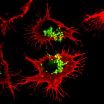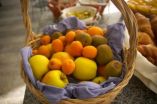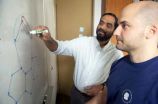(Press-News.org) CAMBRIDGE, Mass. -- People spend 46.9 percent of their waking hours thinking about something other than what they're doing, and this mind-wandering typically makes them unhappy. So says a study that used an iPhone web app to gather 250,000 data points on subjects' thoughts, feelings, and actions as they went about their lives.
The research, by psychologists Matthew A. Killingsworth and Daniel T. Gilbert of Harvard University, is described this week in the journal Science.
"A human mind is a wandering mind, and a wandering mind is an unhappy mind," Killingsworth and Gilbert write. "The ability to think about what is not happening is a cognitive achievement that comes at an emotional cost."
Unlike other animals, humans spend a lot of time thinking about what isn't going on around them: contemplating events that happened in the past, might happen in the future, or may never happen at all. Indeed, mind-wandering appears to be the human brain's default mode of operation.
To track this behavior, Killingsworth developed an iPhone web app that contacted 2,250 volunteers at random intervals to ask how happy they were, what they were currently doing, and whether they were thinking about their current activity or about something else that was pleasant, neutral, or unpleasant.
Subjects could choose from 22 general activities, such as walking, eating, shopping, and watching television. On average, respondents reported that their minds were wandering 46.9 percent of time, and no less than 30 percent of the time during every activity except making love.
"Mind-wandering appears ubiquitous across all activities," says Killingsworth, a doctoral student in psychology at Harvard. "This study shows that our mental lives are pervaded, to a remarkable degree, by the non-present."
Killingsworth and Gilbert, a professor of psychology at Harvard, found that people were happiest when making love, exercising, or engaging in conversation. They were least happy when resting, working, or using a home computer.
"Mind-wandering is an excellent predictor of people's happiness," Killingsworth says. "In fact, how often our minds leave the present and where they tend to go is a better predictor of our happiness than the activities in which we are engaged."
The researchers estimated that only 4.6 percent of a person's happiness in a given moment was attributable to the specific activity he or she was doing, whereas a person's mind-wandering status accounted for about 10.8 percent of his or her happiness.
Time-lag analyses conducted by the researchers suggested that their subjects' mind-wandering was generally the cause, not the consequence, of their unhappiness.
"Many philosophical and religious traditions teach that happiness is to be found by living in the moment, and practitioners are trained to resist mind wandering and to 'be here now,'" Killingsworth and Gilbert note in Science. "These traditions suggest that a wandering mind is an unhappy mind."
This new research, the authors say, suggests that these traditions are right.
Killingsworth and Gilbert's 2,250 subjects in this study ranged in age from 18 to 88, representing a wide range of socioeconomic backgrounds and occupations. Seventy-four percent of study participants were American.
More than 5,000 people are now using the iPhone web app the researchers have developed to study happiness, which can be found at www.trackyourhappiness.org.
INFORMATION: END
Study finds the mind is a frequent, but not happy, wanderer
People spend nearly half their waking hours thinking about what isn’t going on around them
2010-11-12
ELSE PRESS RELEASES FROM THIS DATE:
Voluntary cooperation and monitoring lead to success
2010-11-12
FRANKFURT. Many imminent problems facing the world today, such as deforestation, overfishing, or climate change, can be described as commons problems. The solution to these problems requires cooperation from hundreds and thousands of people. Such large scale cooperation, however, is plagued by the infamous cooperation dilemma. According to the standard prediction, in which each individual follows only his own interests, large-scale cooperation is impossible because free riders enjoy common benefits without bearing the cost of their provision. Yet, extensive field evidence ...
New vaccine hope in fight against pneumonia and meningitis
2010-11-12
A new breakthrough in the fight against pneumonia, meningitis and septicaemia has been announced today by scientists in Dublin and Leicester.
The discovery will lead to a dramatic shift in our understanding of how the body's immune system responds to infection caused by Streptococcus pneumoniae and pave the way for more effective vaccines.
The collaborative research, jointly led by Dr Ed Lavelle from Trinity College Dublin and Dr Aras Kadioglu from the University of Leicester, with Dr Edel McNeela of TCD as its lead author, has been published in the international peer-reviewed ...
Scientists demystify an enzyme responsible for drug and food metabolism
2010-11-12
For the first time, scientists have been able to "freeze in time" a mysterious process by which a critical enzyme metabolizes drugs and chemicals in food. By recreating this process in the lab, a team of researchers has solved a 40-year-old puzzle about changes in a family of enzymes produced by the liver that break down common drugs such as Tylenol, caffeine, and opiates, as well as nutrients in many foods. The breakthrough discovery may help future researchers develop a wide range of more efficient and less-expensive drugs, household products, and other chemicals. The ...
Gene discovery suggests way to engineer fast-growing plants
2010-11-12
DURHAM, N.C. – Tinkering with a single gene may give perennial grasses more robust roots and speed up the timeline for creating biofuels, according to researchers at the Duke Institute for Genome Sciences & Policy (IGSP).
Perennial grasses, including switchgrass and miscanthus, are important biofuels crops and can be harvested repeatedly, just like lawn grass, said Philip Benfey, director of the IGSP Center for Systems Biology. But before that can happen, the root system needs time to get established.
"These biofuel crops usually can't be harvested until the second ...
Stanford scientists identify key protein controlling blood vessel growth into brains of mice
2010-11-12
STANFORD, Calif. — One protein single-handedly controls the growth of blood vessels into the developing brains of mice embryos, according to researchers at the Stanford University School of Medicine. Understanding how the protein, a cellular receptor, functions could help clinicians battle brain tumors and stroke by choking off or supplementing vital blood-vessel development, and may enhance the delivery of drugs across the blood-brain barrier.
"The strength and specificity of this receptor's effects indicate that it could be a very important target," said Calvin Kuo, ...
Fortify HIT contracts with education and ethics to protect patient safety, say informatics experts
2010-11-12
Bethesda, MD—An original and progressive report on health information technology (HIT) vendors, their customers and patients, published online today, makes ground-breaking recommendations for new practices that target the reduction or elimination of tensions that currently mar relationships between many HIT vendors and their customers, specifically with regard to indemnity and error management of HIT systems. In light of the Obama Administration's $19 billion investment in HIT, paid out in ARRA stimulus funds, these recommendations are particularly significant in helping ...
Graphene's strength lies in its defects
2010-11-12
PROVIDENCE, R.I. [Brown University] — The website of the Nobel Prize shows a cat resting in a graphene hammock. Although fictitious, the image captures the excitement around graphene, which, at one atom thick, is the among the thinnest and strongest materials ever produced.
A significant obstacle to realizing graphene's potential lies in creating a surface large enough to support a theoretical sleeping cat. For now, material scientists stitch individual graphene sheets together to create sheets that are large enough to investigate possible applications. Just as sewing ...
New analysis explains formation of bulge on far side of moon
2010-11-12
SANTA CRUZ, CA--A bulge of elevated topography on the farside of the moon--known as the lunar farside highlands--has defied explanation for decades. But a new study led by researchers at the University of California, Santa Cruz, shows that the highlands may be the result of tidal forces acting early in the moon's history when its solid outer crust floated on an ocean of liquid rock.
Ian Garrick-Bethell, an assistant professor of Earth and planetary sciences at UC Santa Cruz, found that the shape of the moon's bulge can be described by a surprisingly simple mathematical ...
Contact among age groups key to understanding whooping cough spread and control
2010-11-12
ANN ARBOR, Mich.---Strategies for preventing the spread of whooping cough---on the rise in the United States and several other countries in recent years---should take into account how often people in different age groups interact, research at the University of Michigan suggests.
The findings appear in the Nov. 12 issue of the journal Science.
Thanks to widespread childhood vaccination, whooping cough (pertussis) once seemed to be under control. But the illness, which in infants causes violent, gasping coughing spells, has made a comeback in some developed countries ...
Fruit flies lead scientists to new human pain gene
2010-11-12
Boston, Mass. - While it has become clear in recent years that susceptibility to pain has a strong inherited component, very little is known about actual "pain genes" and how they work. In the November 12th issue of Cell, researchers at Children's Hospital Boston and their collaborators report on a novel human pain gene. People with minor variations in this gene showed clear differences in susceptibility to acute heat pain and chronic back pain. Corroborating mouse studies give some clues as to how the gene controls pain sensitivity. The gene was uncovered in a genome-wide ...
LAST 30 PRESS RELEASES:
Why does chronic back pain make everyday sounds feel harsher? Brain imaging study points to a treatable cause
Video messaging effectiveness depends on quality of streaming experience, research shows
Introducing the “bloom” cycle, or why plants are not stupid
The Lancet Oncology: Breast cancer remains the most common cancer among women worldwide, with annual cases expected to reach over 3.5 million by 2050
Improve education and transitional support for autistic people to prevent death by suicide, say experts
GLP-1 drugs like Ozempic could cut risk of major heart complications after heart attack, study finds
Study finds Earth may have twice as many vertebrate species as previously thought
NYU Langone orthopedic surgeons present latest clinical findings and research at AAOS 2026
New journal highlights how artificial intelligence can help solve global environmental crises
Study identifies three diverging global AI pathways shaping the future of technology and governance
Machine learning advances non targeted detection of environmental pollutants
ACP advises all adults 75 or older get a protein subunit RSV vaccine
New study finds earliest evidence of big land predators hunting plant-eaters
Newer groundwater associated with higher risk of Parkinson’s disease
New study identifies growth hormone receptor as possible target to improve lung cancer treatment
Routine helps children adjust to school, but harsh parenting may undo benefits
IEEE honors Pitt’s Fang Peng with medal in power engineering
SwRI and the NPSS Consortium release new version of NPSS® software with improved functionality
Study identifies molecular cause of taste loss after COVID
Accounting for soil saturation enhances atmospheric river flood warnings
The research that got sick veterans treatment
Study finds that on-demand wage access boosts savings and financial engagement for low-wage workers
Antarctica has lost 10 times the size of Greater Los Angeles in ice over 30 years
Scared of spiders? The real horror story is a world without them
New study moves nanomedicine one step closer to better and safer drug delivery
Illinois team tests the costs, benefits of agrivoltaics across the Midwest
Highly stable self-rectifying memristor arrays: Enabling reliable neuromorphic computing via multi-state regulation
Composite superionic electrolytes for pressure-less solid-state batteries achieved by continuously perpendicularly aligned 2D pathways
Exploring why some people may prefer alcohol over other rewards
How expectations about artificial sweeteners may affect their taste
[Press-News.org] Study finds the mind is a frequent, but not happy, wandererPeople spend nearly half their waking hours thinking about what isn’t going on around them


